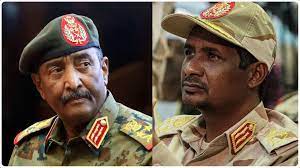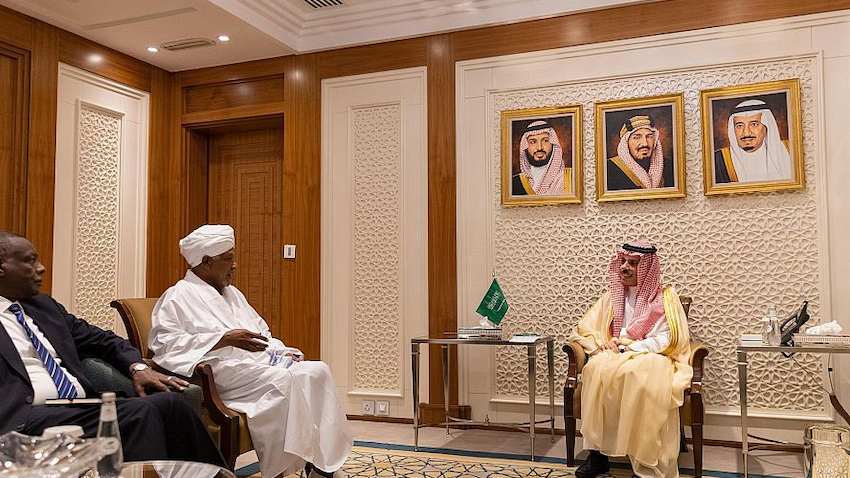
There have been various contours of discussions reported for the talks between the Sudanese Armed Forces (SAF) and the Rapid Support Forces (RSF) which commenced in Jedda, Saudi Arabia on May 6.
Initial news stories stated that the terms of the talks centered around the declaration of a more sustainable ceasefire to allow humanitarian assistance and evacuations to occur from the country with a population of nearly 47 million.
However, in subsequent days there appears to be a recognition of broader discussions between the envoys of the SAF and RSF. Meanwhile thousands are being displaced while others are losing their lives on a daily basis.
Fighting inside Sudan erupted on April 15 after disagreements over the future role of the RSF in a transitional government. The SAF commander General Abdel-Fattah al-Burhan supports the notion of integrating the RSF into the national military structures. General Mohamed Hamdan Dagalo (Hemeti), the commander of the Rapid Support Forces (RSF) has been reported to want a ten-year transitional period for his personnel to merge with the SAF.
What is striking about the negotiations are that they are taking place under the mediation efforts of the Kingdom of Saudi Arabia and the United States. Both of these states have a vested interest in the outcome of the current internal conflict. Washington does want to reset relations with Khartoum albeit on its own terms. Saudi Arabia, with its long-term relationship with Sudan which extends to both religious as well as geostrategic objectives, wants to maintain and extend its existing alliance with Khartoum.
Role of the Gulf Monarchies in Stifling the Sudanese Revolution
The response of Saudi Arabia and the United Arab Emirates (UAE) during the unfolding political situation in the early months of 2019 when thousands were demonstrating in the streets daily, was to stabilize the military and prevent the emergence of a civilian government committed to genuine democratic reforms. Immediately after the forced removal of former President Omer Hassan al-Bashir in April 2019, the Saudis and the UAE announced substantial sums of direct financial assistance to the military regime.
Rather than allow the process of political transformation to continue under the civilian leadership of the Forces for Freedom and Change (FFC), the youth resistance committees and the numerous opposition parties, the military seized power in an effort to confuse the masses by suggesting that it was the people that removed al-Bashir.
According to an article published by Reuters press agency in April 2019:
“Saudi Arabia and the United Arab Emirates said on Sunday (April 19) they had agreed to send Sudan $3 billion worth of aid, throwing a lifeline to the country’s new military leaders after protests led to the ousting of President Omar al-Bashir. The two Gulf Arab countries will deposit $500 million with the Sudanese central bank and send the rest in the form of food, medicine and petroleum products, their state news agencies said in parallel statements. The aid comes amid wrangling between the Transitional Military Council (TMC) and protesters and opposition groups who are demanding that civilians lead a two-year transitional period. The protesters who have kept up a sit-in outside the Defense Ministry since Bashir was removed on April 11. They have demonstrated in large numbers over the past three days, pressing for a rapid handover to civilian rule. TMC head Abdel Fattah al-Burhan told state TV that the formation of a joint military-civilian council – one of the activists’ demands – was being considered.”
General al-Burhan claimed that the military coup of April 11, 2019 against President al-Bashir was in line with the revolutionary movement that the Sudanese people desired. The Sudanese Professional Association (SPA) in public statements rejected the assertion made by the Transitional Military Council (TMC) led by al-Burhan and insisted on continuing the resistance aimed at the removal of the armed forces from power.
When the mass organizations, professional associations and youth-led resistance committees in the neighborhoods continued to demonstrate and occupy the areas around the military headquarters in Khartoum, they were met with the brute force of the Sudanese state bolstered by the assistance from Saudi Arabia and the UAE. The days-long massacres of political activists in June 2019 should have sealed the fate of the security forces as legitimate participants in any transitional process.
Two years later in 2021, the same Reuters media organization noted:
“Saudi Arabia and the United Arab Emirates had jointly promised $3 billion in aid to Sudan and Sudanese officials previously indicated that $750 million of that aid had been delivered, including a $500 million deposit in the central bank. However, there was no news of further disbursements, and it was unclear whether the remainder of the aid would be delivered after civilian groups struck a power-sharing deal with the military in the summer of 2019. Some of the aid was expected to arrive in the form of badly needed supplies of wheat, medicine, fuel and other goods, and Yousif said joint committees would determine how the remaining $1.2 billion of the Saudi Arabian grant would be delivered.”
Sudan’s military structures serving as the government are being subsidized in order to prevent any semblance of a revolutionary movement from coming to power in Khartoum. Another coup was staged by al-Burhan and Hemeti in October 2021 unseating interim Prime Minister Abdalla Hamdok and removing the first iteration of the Sudan Sovereign Council, an unholy alliance between the civilian and military leadership which could not stop the repressive policies of the security forces let alone send the army back to its barracks.
Washington and its Allies Continue to Subvert the Will of the People
After the eruption of the April 15 crisis, the government of the Republic of South Sudan headed by President Salva Kiir, offered to host talks between the two belligerents in Juba, the capital. Nonetheless, this neighboring state which is a part of the African Union (AU), the 55-member states continental organization, was not able to enact their proposal.
A mediation effort by the AU or other regional organizations such as the Inter-governmental Authority on Development (IGAD), the East Africa Community (EAC) or the Southern African Development Community (SADC), etc., would have been a continuation of the recent efforts to develop “African solutions to African problems.” In Ethiopia, the headquarters of the AU, beginning in 2020 when fighting broke out between the central government of Prime Minister Abiy Ahmed and the Tigray People’s Liberation Front (TPLF), would eventually reach a resolution during late 2022 through the work of the governments of the Republic of South Africa and the Republic of Kenya where discussions were held that ended the conflict.
At present the ceasefire in northern Ethiopia seems to be holding between the TPLF and the Abiy administration in Addis Ababa. The Ethiopia peace agreement has been hailed as a success illustrating the potential for further successes under the diplomatic leadership of the AU.
The U.S. under the previous administration of President Donald Trump and the current government of President Joe Biden have played a destructive role in the Federal Democratic Republic of Ethiopia along with neighboring Republic of Sudan. The many visits to Khartoum by U.S. envoys have only served to further the instability in Sudan while strengthening the intransigence of the military.
Successive administrations in Washington have worked ceaselessly to undermine the genuine independence and sovereignty of Sudan. The country, which was once the largest geographic nation-state in Africa, was partitioned in 2011 after decades of civil war largely at the aegis of the U.S., Britain and Israel. Sudan and South Sudan today are suffering from the impact of the rupture of the once promising emergent oil-producing state.
On May 6, the AU headquarters in Addis Ababa issued the following statement:
“The Chairperson of the African Union Commission, Moussa Faki Mahamat, is closely following the Saudi Arabia – United States facilitated talks between the Sudanese Armed Forces (SAF) and the Rapid Support Forces (RSF), which commenced today, in Jeddah. The Chairperson urges the parties to agree to a humanitarian ceasefire as a matter of urgency as a first step to allow for the immediate supply of relief materials to ease the suffering of Sudanese civilians, who have borne the brunt of this crisis. The Chairperson also calls on the SAF and RSF to promptly agree to open humanitarian corridors to ease the distribution of essential supplies and restoration of services. The Chairperson reiterates the imperative for the parties to comply with International Humanitarian Law and International Human Rights Law and to permanently silence the guns in the supreme interest of the people of Sudan. The Chairperson stresses the urgent need for the international community to combine their efforts strongly and expeditiously in a collective action, to express solidarity with the Sudanese people for peace, democracy, and development.”
Despite these words and the willingness of the AU to mediate a sustainable end to the fighting in Sudan, the role and status of the continental body are being constantly undermined. However, until there is an African solution adopted to the Sudanese political crisis, the country will continue to fail in the quest for peace, unity and security.
* Abayomi Azikiwe is the editor of the Pan-African News Wire. He is a regular contributor to Global Research.






